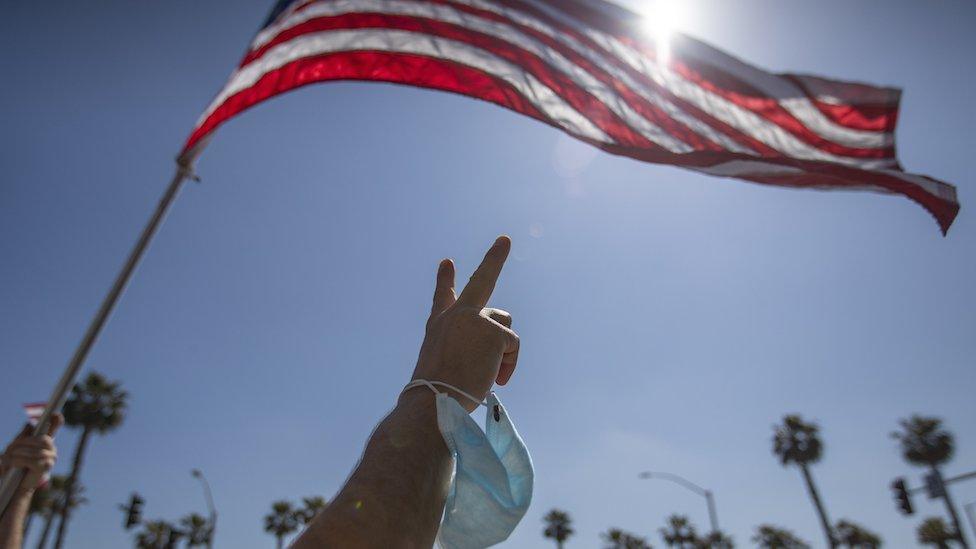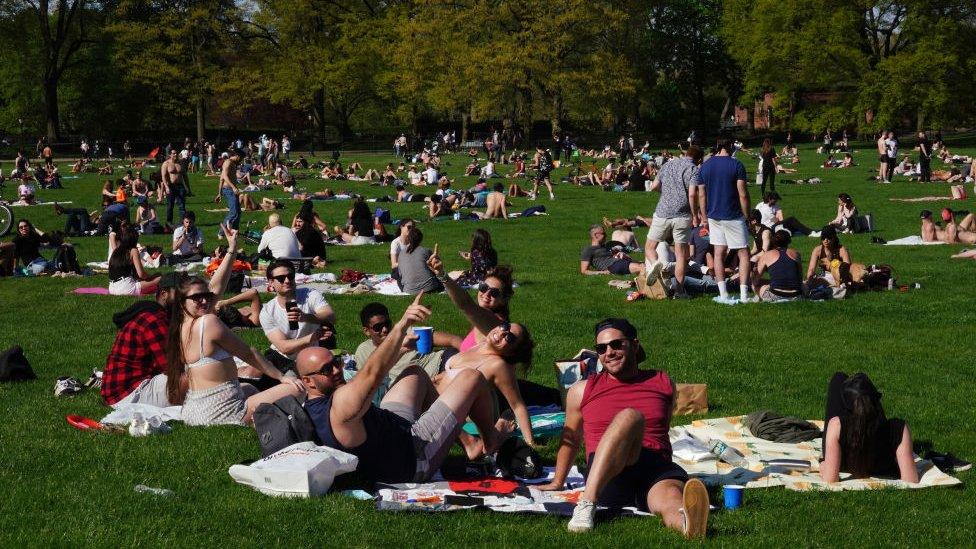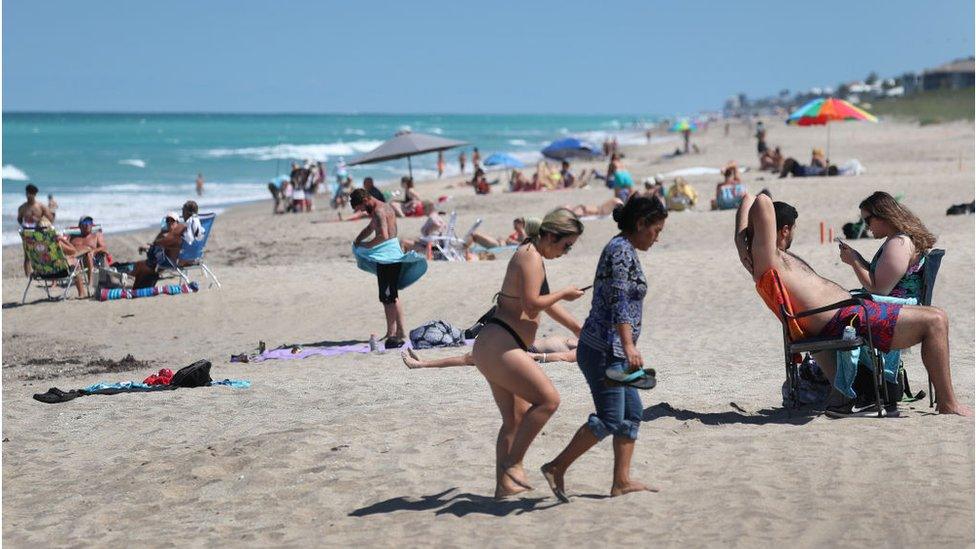Coronavirus: Why is there a US backlash to masks?
- Published

While US health experts continue to encourage mask use in public, and more parts of the country adopt this guidance, there has been pushback from some Americans about covering up. Why?
Many protesters across the states have been pictured defying social distancing guidance without masks or face coverings. Online, the debate about mask effectiveness still plays out, with some claiming masks are not effective - or enforceable under US law.
This is in marked contrast to other countries where populations have generally been compliant in wearing face coverings.
The UK has yet to adopt the policy, pointing to WHO advice which says only health workers should wear them. But the London Underground advises passengers to cover their nose and mouth.
So what does the resistance in the US look like?
Ohio's Republican governor Mike DeWine - who has been praised for his early efforts to stem the spread - had to walk back an order requiring residents to wear masks in public as businesses reopened, calling the measure "a bridge too far".
"People were not going to accept the government telling them what to do," he told ABC News on Sunday.
There are similar stories across the nation, though many states and local governments have rules or guidance encouraging masks in public spaces.

Some New Yorkers were seen without masks in Central Park
In Stillwater, Oklahoma, city officials had to rescind a mandatory mask order for local restaurants and businesses after employees were threatened and verbally abused by residents who refused to cover up.
In Flint, Michigan, a security guard was shot and killed in an altercation that allegedly began over a customer's refusal to cover their face per the state governor's order.
Many New Yorkers were photographed in Central Park over the weekend enjoying the warm weather without proper nose and mouth coverings; similar scenarios have played out on Californian and Floridian beaches.
What have political leaders said?
On Monday, New York Governor Andrew Cuomo said it was "disrespectful" for people to refuse to wear a mask in public. "You can literally kill someone because you did not want to wear a mask. How cruel and irresponsible would that be?"
But the mixed messages have come from the very top.
At the same time as the Centers for Disease Control (CDC) announced new guidance that Americans should cover their faces in public to curb Covid-19's spread, President Donald Trump said it was "voluntary" and he himself would not do so.
Then Vice-President Mike Pence was pictured visiting a health clinic without wearing one - which he later apologised for.
Trump doesn't see face mask necessary behind 'the great Resolute desk'
Why do so many Americans seem to have an issue with them?
Emory University Global Health and Law Professor Polly Price says the situation in America now mirrors what happened during the 1918 Spanish flu outbreak.
At the time, the US Surgeon General advised everyone to make and wear their own mask - just as instructions are now on the Centers for Disease Control's website, guides were sent to newspapers.
"It was up to state and local governments whether they were going to require their populations to do it - not all did," she says.
Some cities levied fines for people not wearing them.
"There were very few court challenges, but they generally upheld the authority of local governments to have face mask ordinances," Prof Price says.
"We do have a long tradition of individual rights, so even during the Spanish flu people would sue about the schools [being] closed. Or restaurants and bars were closed and people would sue about that and they routinely lost."
In the same way that protesters have argued the lockdowns infringe their rights, much of the anti-mask rhetoric seems to come from the same well - American resistance to government mandates.
But Prof Price says requiring masks during a health crisis is not fundamentally different from other safety regulations.
"I think that governors have extensive power to order measures that protect the public health," she says.
"As long as they can show that connection, just based on our constitutional tradition, that would be upheld. It'd be a different question if the penalty was a year in jail for not wearing a mask."
Why was health advice unclear for so long?
Guidelines have been confusing, says Professor James Thomas of University of North Carolina at Chapel Hill Epidemiology.
One reason for that was, initially, masks needed to be prioritised for medical workers, he told the BBC. Another reason was our unfamiliarity with the virus itself.
"Over time, we're learning more about it, how it's transmitted, situations in which it is not transmitted and we're adjusting our recommendations based on what we learn."

Florida has begun to reopen public spaces like beaches
Prof Thomas says the learning has been particularly slow with Covid-19 because of a lack of testing. But we know now that the novel coronavirus travels through droplets, like a sneeze in close quarters, rather than lingering in the air for long periods of time.
This is how masks can help.
Prof Thomas says in one case study in a Hong Kong hospital, around 70 individuals ended up being near a patient who was later found to have the virus. But, because the patient and everyone in the hospital were wearing masks, no one else contracted it.
But not every face covering is created equal.
If you're making your own, using a thick fabric - something where, if you hold it up to a light, you can't see through it - is best.



A SIMPLE GUIDE: What are the symptoms?
LIKE 9/11 EACH DAY: A New York paramedic's diary
FACTORY HOTSPOT: The untold story behind America's biggest outbreak
GUNS & CHEESE: The unexpected items deemed 'essential'
REASON TO HOPE: The good that may come out of this crisis

Are there exceptions if you're somewhere quiet?
Addressing mask-reluctance on Monday, Governor Cuomo also told residents they did not need to wear a mask all the time, like, say, on a walk in the woods. But is that true?
"If you're going for a walk and no one is around, I still think you should have your mask with you - it should be seen as a courtesy if somebody else approaches that you pull your mask up," says Harvard University Public Health Professor Joseph Allen.
The only way we're going to get through this is with a great deal of social trust, he says.
"Handwashing is social trust. Covering your coughs is social trust. Maintaining six feet of distance from others is social trust. Wearing a mask is social trust."
There will likely be "pendulum swings" of how cautious people are being in the coming months as cases rise and ebb, Prof Thomas says, "but we're likely to be seeing masks around for a good long time".